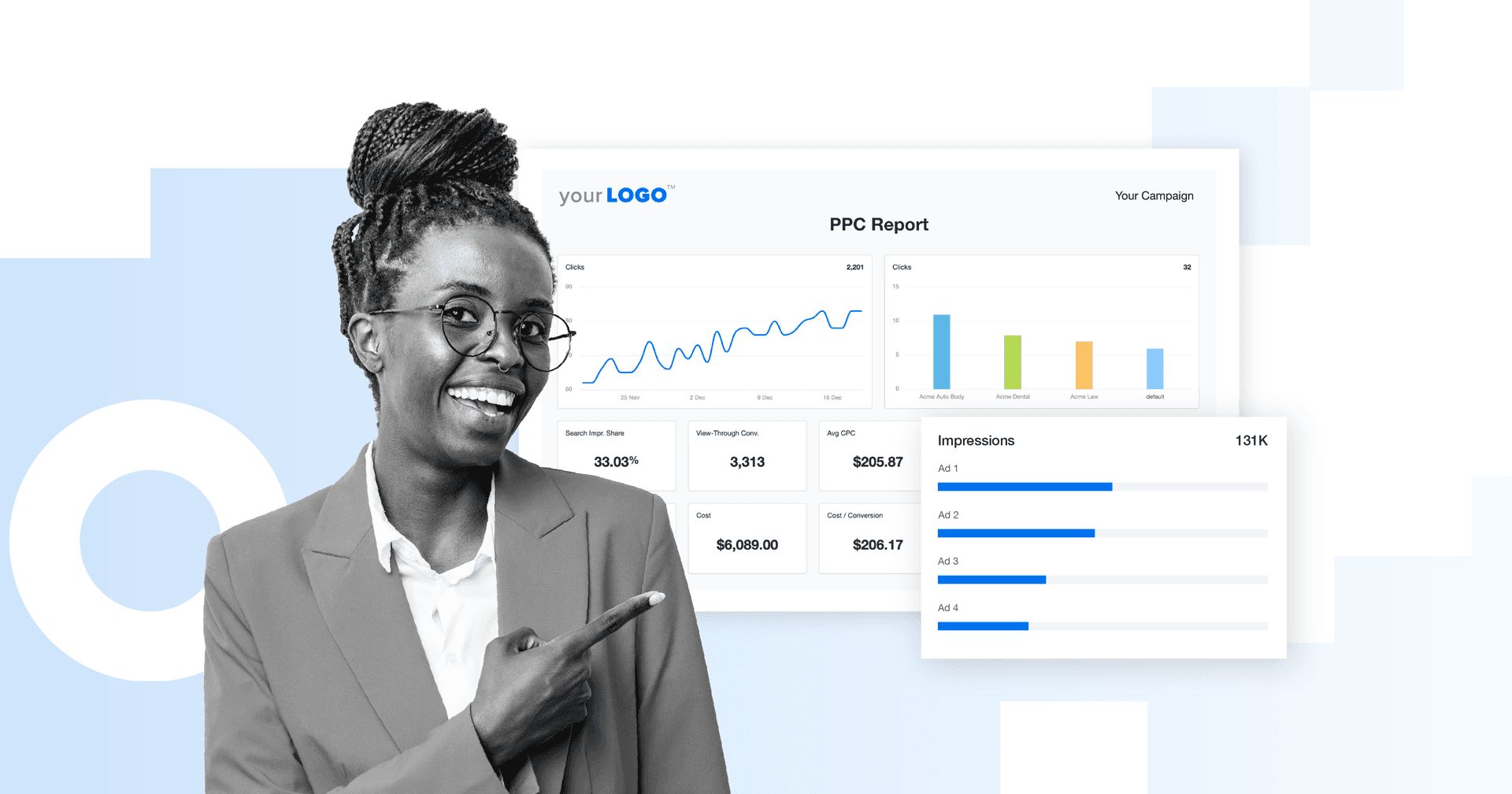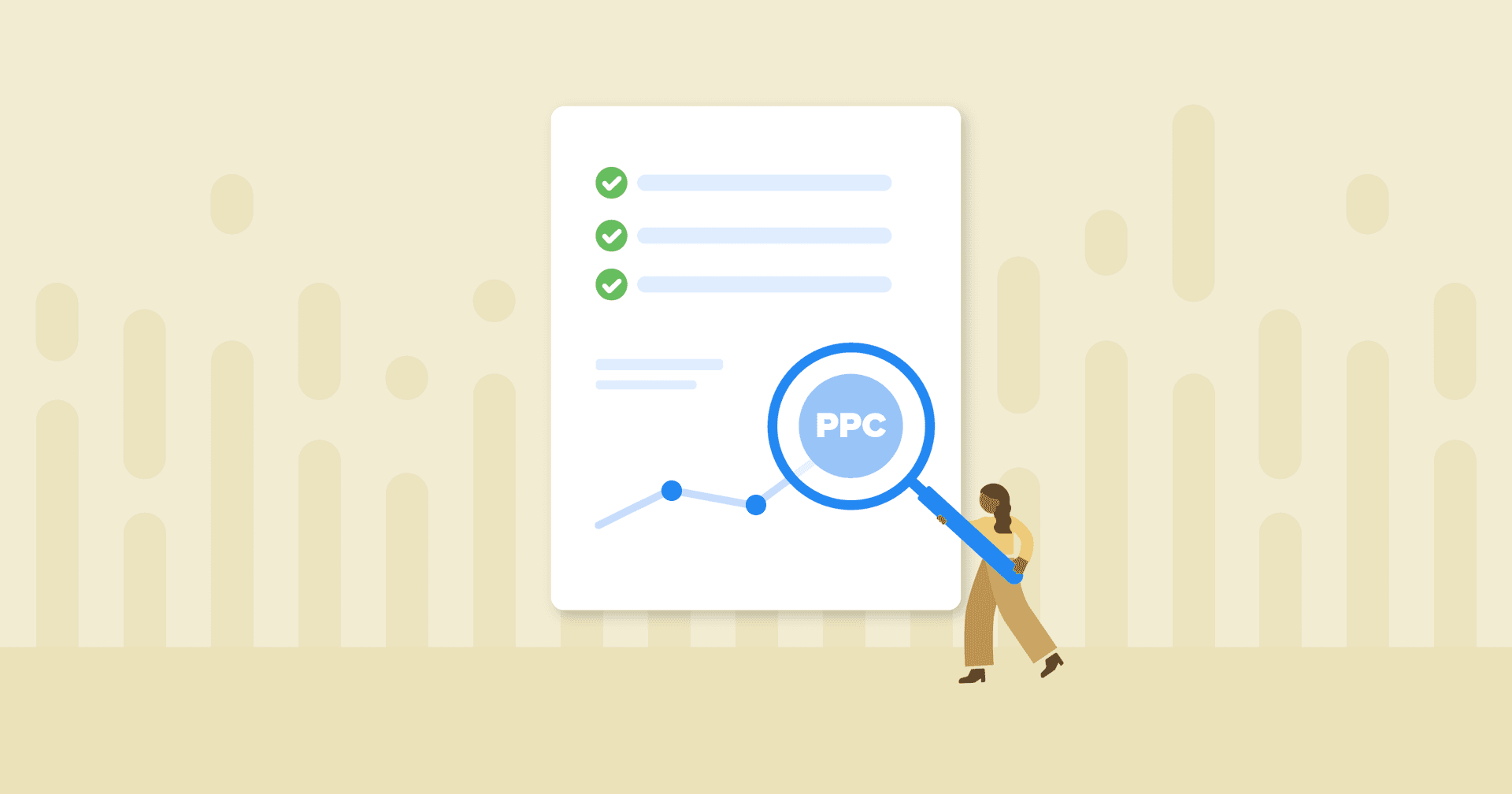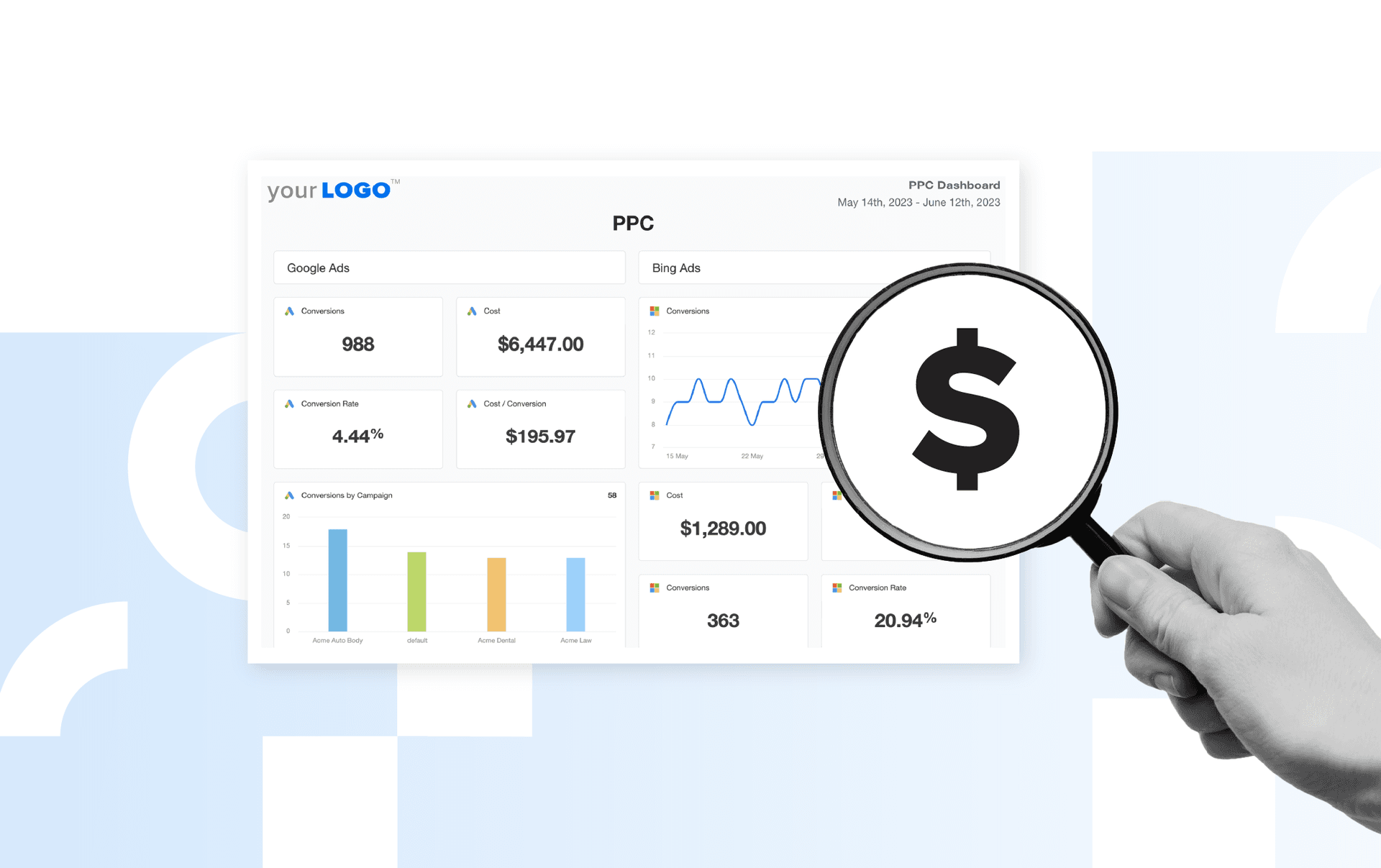Table of Contents
QUICK SUMMARY:
Struggling to connect the dots on PPC advertising? From discovering must-track PPC metrics to intuitive tools that save hours, this article is your roadmap to making paid media and reporting friction-free.
Your clients expect answers. Which Google Ads campaigns are actually driving revenue? Where is their budget going? Why are some ads converting while others flop?
If you're still piecing together fragmented PPC data from multiple platforms and guessing at performance, you're not alone. Without precise PPC tracking, you're stuck reacting. Every decision feels like a shot in the dark—pausing underperforming ads too late, bidding too high on the wrong keywords, or missing chances to double down on what’s working.
Smart PPC tracking changes everything. With the right tools and processes in place, you’ll see exactly what’s happening across every campaign in real time. That means cutting wasted spend, refining keyword targeting, tweaking ad copy, adjusting bids on the fly, and aligning every dollar spent with real business results.
In this article, you’ll learn how to track smarter, optimize faster, and turn PPC data into client wins, consistently maximizing PPC ROI. From key SEM metrics to intuitive platforms that save hours, we’ll show you how to make paid media work harder and make your agency indispensable.
What Is PPC Tracking?
PPC tracking is how you stay on top of every click, cost, and conversion happening in your clients’ Pay-Per-Click (PPC) ads campaigns across paid advertising platforms like Google Ads, Microsoft Advertising (formerly Bing Ads), and paid social channels such as Facebook, Instagram, and LinkedIn.
It requires using tools like AgencyAnalytics, Google Tag Manager, and SEMrush to monitor key PPC metrics, including conversions, Click-Through Rates (CTR), and Cost Per Click (CPC).
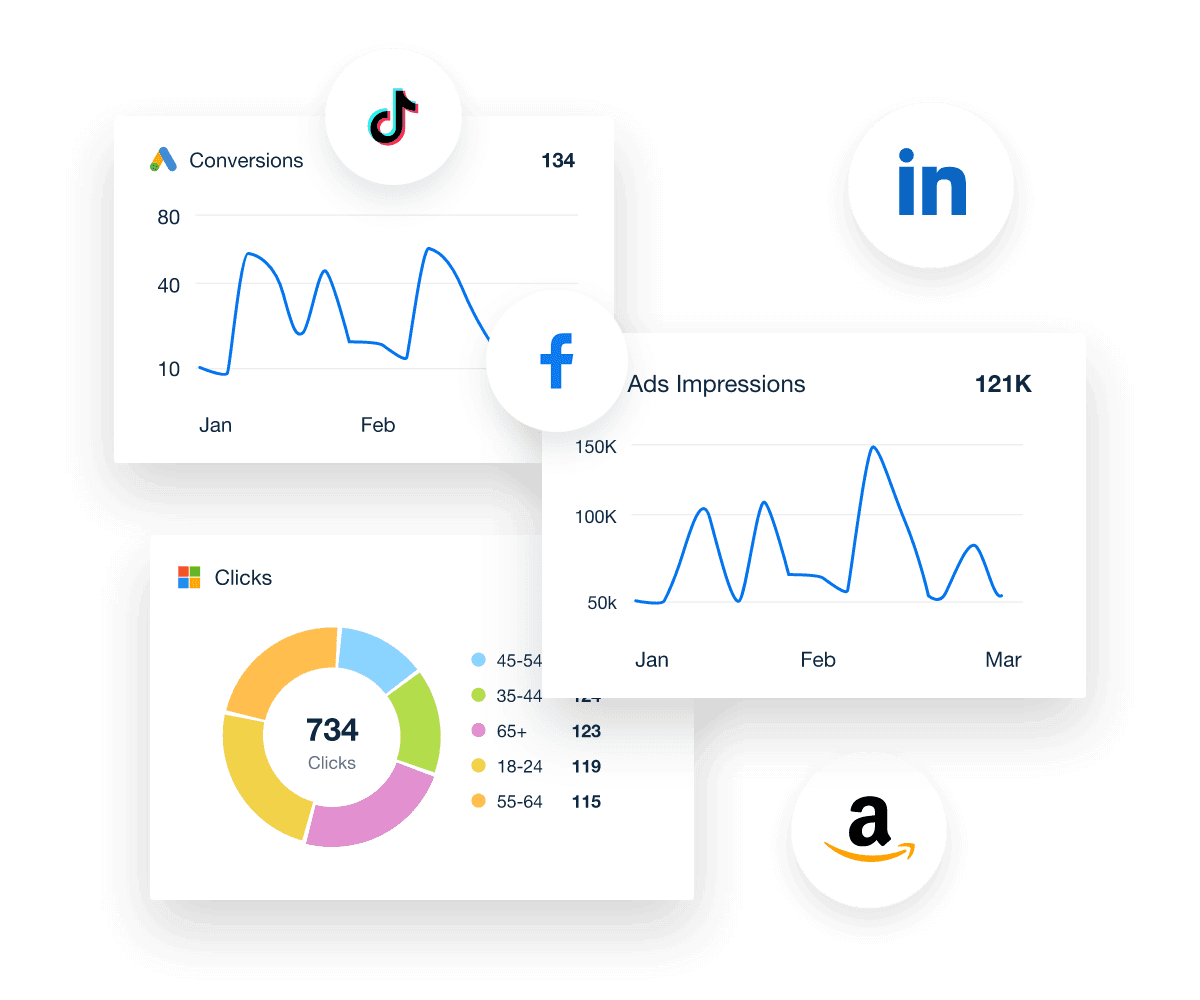
Tracking how these metrics shift over time helps marketing teams understand their paid search analytics and make informed adjustments, such as:
Fine-tuning keyword targeting
Improving landing page design
Adjusting ad copy
Altering bidding strategies
… All to ensure every marketing campaign drives stronger performance and maximizes ROI for clients.
PPC tracking isn’t a set-it-and-forget-it task. Success means staying in the data every day. It’s a continuous effort that keeps your ads visible, competitive, and aligned with your clients’ goals, whether that’s generating qualified leads, increasing online sales, or boosting website traffic.
Everything we do is tied to that specific business's growth strategy. Based on the goals in their growth strategy, we would determine the type of campaign, and from there, we could dive into specific campaign bidding and keyword strategies. By setting a solid foundation for our clients, we can attain better long-term results.
Sara Kremm, Sr. Paid Media and Conversion Specialist, OTM
When paired with search engine optimization (SEO), PPC tracking offers a complete view of your clients’ digital performance, helping you optimize both paid and organic channels for maximum impact.
Key PPC Metrics You Should Be Monitoring
Let’s examine which PPC metrics matter most to clients and what these metrics signal about your campaigns.
Click-Through Rate (CTR)
CTR measures the percentage of people who click on an ad after seeing it.
High CTR? Your copy and targeting hit the mark.
Low CTR? Time to tighten targeting and rewrite ads that stop the scroll.
Conversion Rate
Conversion rate shows the percentage of clicks that result in a desired action, such as a purchase or form submission.
High conversion rate? Hooray! The landing page and offer are compelling and aligned with search intent.
Low conversion rate? Something’s broken post-click. Fix slow pages, confusing forms, or weak offers fast.
Cost Per Conversion / Cost Per Acquisition
Cost Per Conversion, or Cost Per Acquisition (CPA), calculates how much you spend to acquire a customer. Monitoring CPC or CPA helps ensure that your campaigns are cost-effective for the client.
Low CPA? Your campaigns are efficiently converting leads at a cost-effective rate.
High CPA? Cut low-intent clicks and refine bids to drive only qualified traffic.
Agency Tip: Before deciding whether CPA is too high or low, it's critical to understand what a customer is worth to your client’s business. Determine the Customer’s Lifetime Value (LTV) or Average Order Value (AOV) first to set realistic CPA benchmarks. If a new customer generates significant revenue over time, a higher CPA may still make sense and deliver a strong return on ad spend.
Return on Ad Spend (ROAS)
ROAS measures the revenue generated for every dollar spent on advertising.
High ROAS? Your campaigns are driving profitable results and justifying the ad spend.
Low ROAS? Either your targeting is off or the funnel needs work. Diagnose fast.
Quality Score
Quality Score is a measure that’s provided by platforms like Google Ads. It assesses the relevance and quality of your ads and keywords.
High Quality Score? You’re aligned with user intent and earning lower costs per click.
Low Quality Score? The ad and landing page aren’t aligned. Fix the disconnect.
Impression Share
Impression Share indicates the percentage of total impressions ads receive compared to the total available.
High Impression Share? Your client is dominating visibility and capturing market share.
Low Impression Share? Competitors are winning visibility. Fix budget gaps or improve Quality Score to regain it.
Use Industry Benchmarks To Evaluate PPC Performance
There’s no one-size-fits-all benchmark for PPC success. A strong conversion rate for an ecommerce brand won’t necessarily apply to a law firm or local service provider. Every client has different goals and audiences. That’s why smart agencies compare PPC results against realistic, relevant benchmarks, not generic targets.
Still, industry data offers valuable context. By benchmarking your clients' PPC metrics against real agency campaigns, you set expectations, find gaps, and show exactly where they stand in the market.
Here’s a look at the average conversion rates by ad platform:
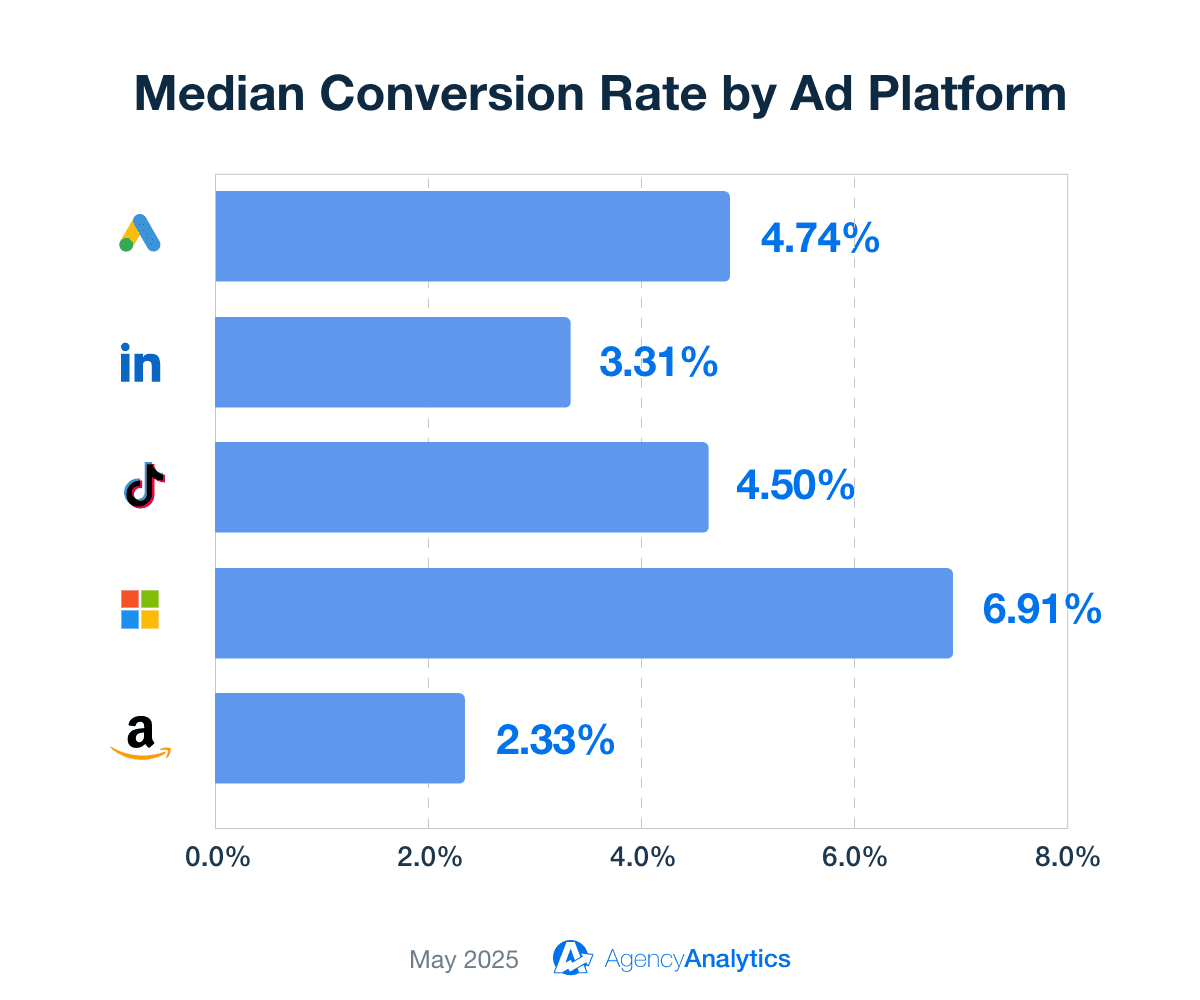
These benchmarks come from 150,000 campaigns run by AgencyAnalytics users, giving you access to what’s really happening across agencies like yours.
So what does this mean for your campaigns?
If your client’s Google Ads campaigns are converting at 2%, while the industry average is closer to 5%, that’s a signal. Maybe the offer doesn’t align with search intent, or the landing page needs improvement. On the flip side, if they’re hitting or exceeding benchmarks, you can confidently show clients their campaigns are on track, or even outperforming competitors.
Want to dive deeper? With the AgencyAnalytics’ Benchmarking tool, you’ll access the most up-to-date performance comparisons across key PPC metrics so you always know how your clients stack up in the market.
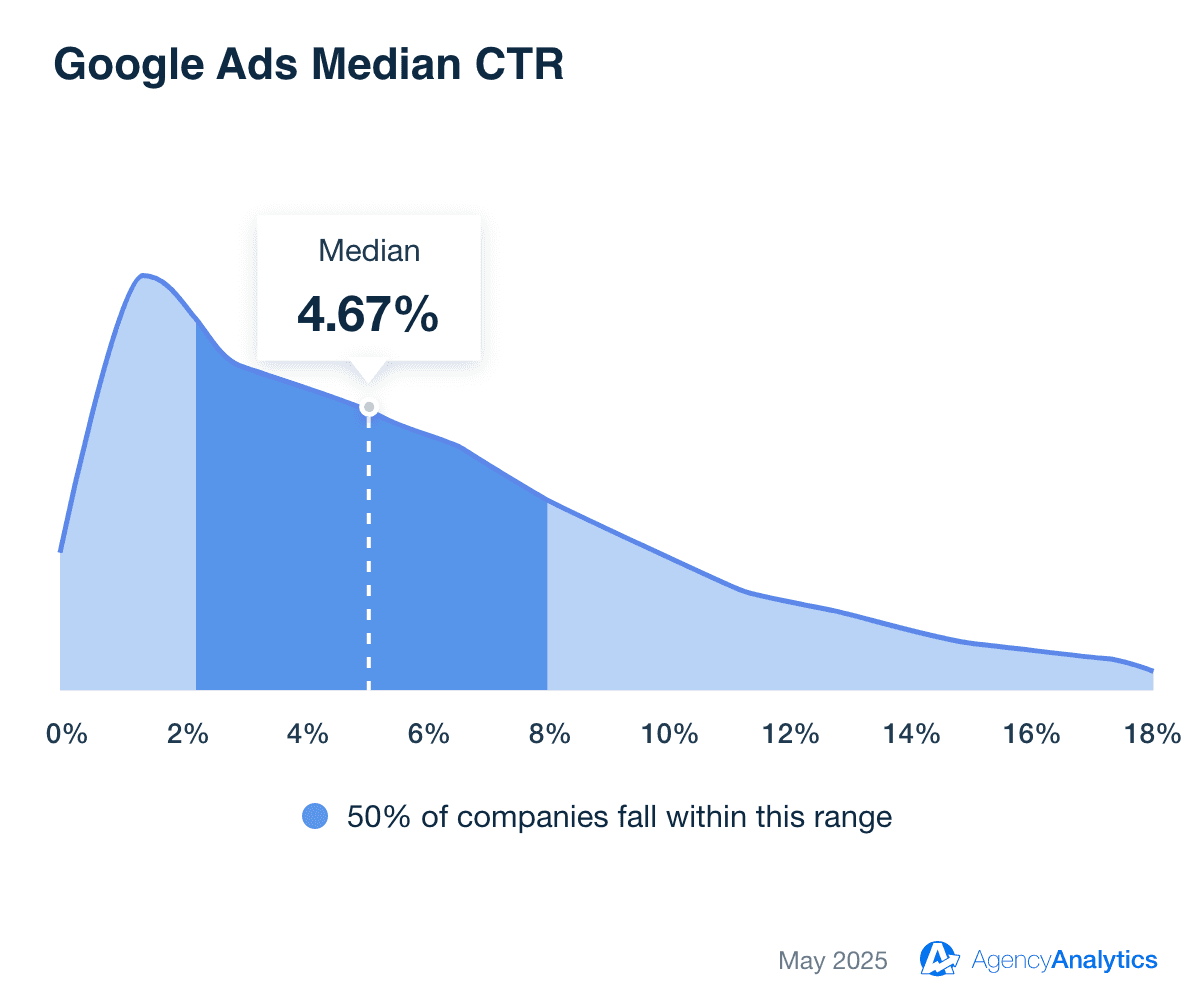
Benchmark client PPC performance against real agency data. Spot opportunities, set smarter goals, and show clients the impact. Try AgencyAnalytics free for 14 days.
How To Set Up PPC Tracking in 4 Steps
Tracking the right metrics is only part of the equation. Without a solid setup, even the best data leads you astray, causing missed opportunities, wasted spend, and frustrated clients.
A clean, organized foundation ensures your data tells the whole story. When set up correctly, PPC tracking reveals where every dollar goes, which campaigns drive results, and what to optimize next.
Here’s how to lay the groundwork for accurate, impactful PPC campaign management:
1. Choose a PPC Tracking Platform
First things first: you need a platform that pulls all your campaign data into one place. No more logging into five different dashboards or copying data into spreadsheets. From there, automate PPC reporting to keep clients informed without manual exports. The right PPC tracking tool will centralize everything, so you focus on performance, not data entry.
AgencyAnalytics makes this easy. With {{integration count}}+ integrations, it automatically pulls PPC data from Google Ads, Microsoft Advertising, Facebook Ads, and more into a single PPC reporting dashboard.
But don’t stop at basic reporting when searching for your tool. A smart PPC tracking platform should also:
Support Multi-Channel Reporting: PPC campaigns don’t operate in silos. You need to see PPC, SEO, email, and social side-by-side to get the full picture and spot cross-channel trends.
Offer Customizable Dashboards and Reports: Not every client cares about the same KPIs. Build custom views that highlight what matters, whether that’s ROAS, conversions, or impression share.
Automate Reporting and Alerts: Stop wasting hours on manual reports. Schedule them to send automatically and set up alerts to catch performance drops before they become problems.
Enable Team Collaboration: When multiple team members manage PPC, user permissions and shared workflows keep everyone aligned and reduce errors.
We’ll share some of the best PPC tracking tools in the next section.
Agency Tip: Prioritize PPC tools that update frequently (daily or in real time). Fresh data ensures your team makes optimization decisions based on what’s happening now, not outdated performance trends.
2. Set Up Conversion Tracking
Getting clicks is only part of the story. What happens after someone lands on the page matters just as much, if not more. That’s where conversion tracking comes in.
This is how you move beyond vanity metrics like impressions and clicks to what really counts: actions. Purchases, sign-ups, downloads, phone calls—each tells you which PPC campaigns are truly driving value for your clients.
Conversion tracking is vital. Take the time to set it up properly and ensure the ads are generating profit.
Adam Palmer, President, Inertia Digital Marketing
Setting up conversion tracking means installing the right tracking codes or pixels on your client’s website. If you're using a Google Ads account, link it with your client’s Google Analytics account for seamless tracking and a full view of post-click behavior.
Best Practices for Conversion Tracking:
Track Every Meaningful Action: Don’t stop at sales. Capture newsletter sign-ups, video views, add-to-cart actions, and even time spent on key pages. These micro-conversions reveal how engaged the visitors are and where campaigns might fall short.
Check Tracking Accuracy Regularly: Tags break, and pixels misfire. Audit frequently to ensure conversions are firing as expected and the data stays reliable.
Align Conversions With Client Goals: Different clients care about different outcomes. For one, brand awareness and lead generation may be the focus. For another, it's all about revenue. Tailor your conversion tracking setup accordingly.
Remember, there's no one-size-fits-all approach with PPC marketing. The most effective bidding strategy often involves a mix of different strategies based on campaign goals, industry, and audience behaviour. Regular optimization and adaptation are key to success.
Sam Yielder, Paid Media Manager, Squidgy
Agency Tip: Don’t stop at major conversions. Track micro-conversions (like newsletter sign-ups, video views, or add-to-carts) to build a fuller picture of how users engage with your client’s site and where optimizations will move the needle.
3. Clarify the Attribution Model
A conversion rarely happens after just one click. Users often interact with multiple ads, search terms, and campaigns before taking action. That’s why defining the right attribution model is essential for accurate PPC reporting.
Attribution helps you understand which touchpoints drive results—and how to credit them.
Here are the most common attribution models:
Last-Click: The final interaction gets all the credit.
First-Click: The first touchpoint earns full credit.
Linear: Credit is shared evenly across every interaction.
Data-Driven: Machine learning assigns credit based on real conversion paths.
Each model tells a different story. If you rely solely on last-click, for example, you may undervalue upper-funnel campaigns that generate awareness and guide users into the buying process.
Best Practices for Setting Attribution:
Choose Models Based on Client Goals: For lead generation, first-click attribution highlights what sparks interest. For ecommerce, last-click or data-driven models give a clearer view of what closes sales.
Review Models Often: Campaign goals change. A client shifting from awareness to conversion campaigns needs updated attribution to match.
Explain the Logic to Clients. Attribution models are sometimes confusing. Show clients exactly how credit is assigned and why. This builds trust and helps them see the true value of multi-touch campaigns.
Agency Tip: Attribution is fluid. As campaign objectives shift, revisit your models to ensure you're measuring performance in the way that matters most.
4. Set Up CRM Data Importing
Clicks and conversions tell part of the story. To show clients the full picture, you need to connect PPC performance with real business results. That’s where CRM integration comes in.
Now you’re tracking what matters most: lead quality, pipeline progress, and customer lifetime value. This lets you show clients exactly which campaigns drive revenue, not just clicks.
For example, two campaigns may generate the same number of leads. But CRM data reveals that leads from Campaign A mostly drop off, while leads from Campaign B consistently close. Without CRM integration, that critical insight is lost.
Best Practices for CRM Data Importing:
Close the Loop on Lead Quality: Not every lead is a win. Use CRM data to see which campaigns bring in qualified, high-value prospects and which attract tire-kickers.
Optimize Based on Revenue, Not Just Conversions: Go beyond form fills or phone calls. Shift budgets toward campaigns that generate actual sales and revenue.
Align With Sales Teams: CRM integration bridges the gap between marketing and sales. Work together to ensure PPC campaigns support the full buyer journey from first click to closed deal.
Agency Tip: Go beyond setup. Regularly analyze CRM data to determine which PPC campaigns bring in the most valuable customers, then refine the targeting to focus on what's working.
And remember: Setting up PPC tracking isn’t a one-and-done task. Revisit your tracking often to ensure accuracy, align with new client goals, and close any data gaps that could hold back performance.
4 of the Best PPC Tracking Tools for Agencies
With so many PPC tracking tools offering endless data points and integrations, it's easy to get lost in the noise! We’ve narrowed our list to the best PPC conversion tracking tools that help agencies track PPC campaigns across popular advertising platforms.
Let’s see how some of the best pay per click tools stack up:
1. AgencyAnalytics
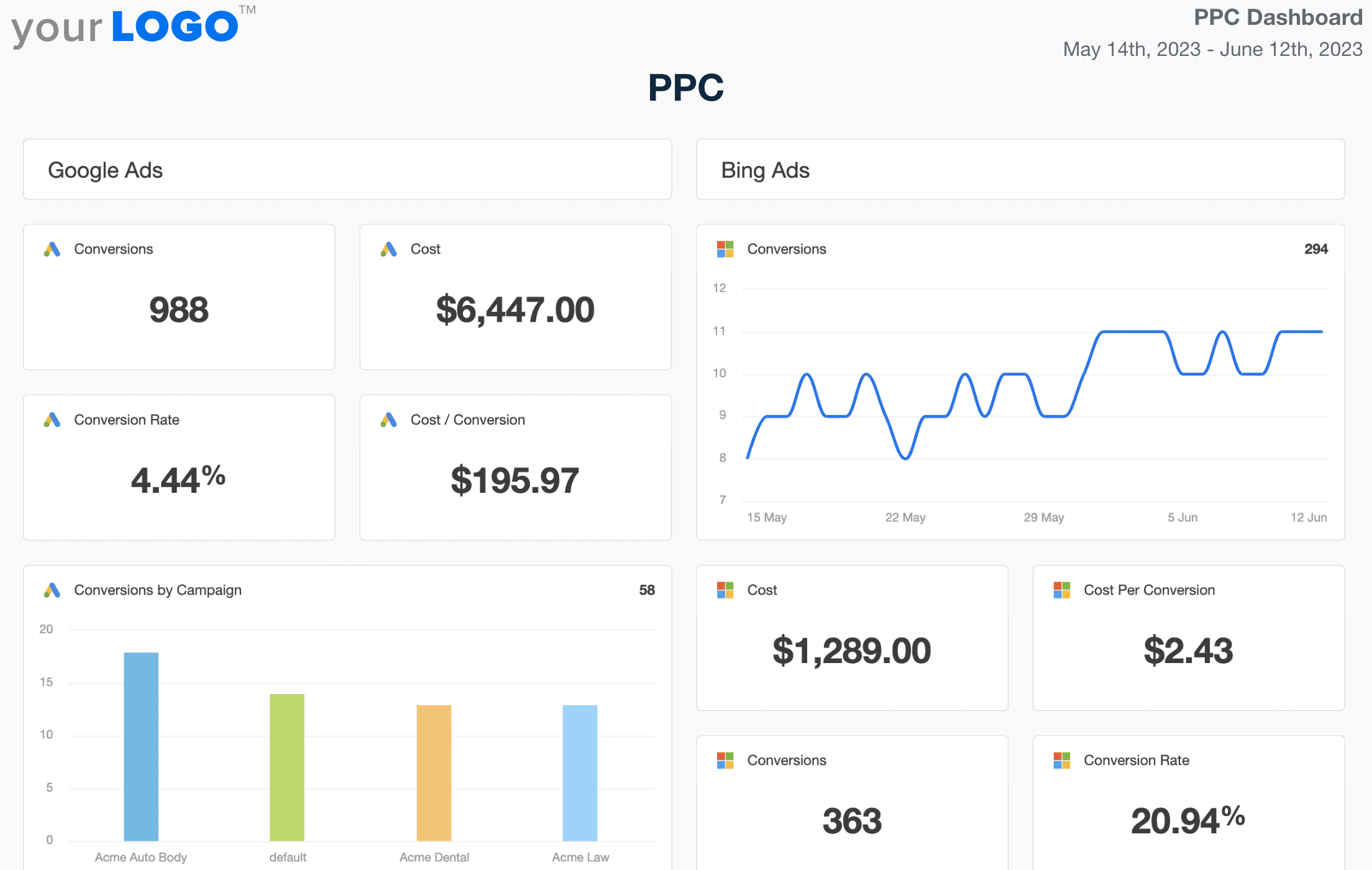
AgencyAnalytics is purpose-built for agencies that manage multiple PPC campaigns across clients and channels. The platform consolidates PPC reporting from Google Ads, Microsoft Advertising, Facebook Ads, and more ad platforms, bringing your campaign data into a single, easy-to-use interface.
With AgencyAnalytics, automating PPC reporting is simple thanks to {{integration count}}+ integrations that centralize all your campaign data. From there, you control how results are displayed. Build custom dashboards, create tailored reports, and even set up custom metrics to track the KPIs that matter most to your clients.
Agency Tip: Need a head start? Use our PPC report template to quickly pull in campaign data and create client-ready reports in minutes. Preview the template here.
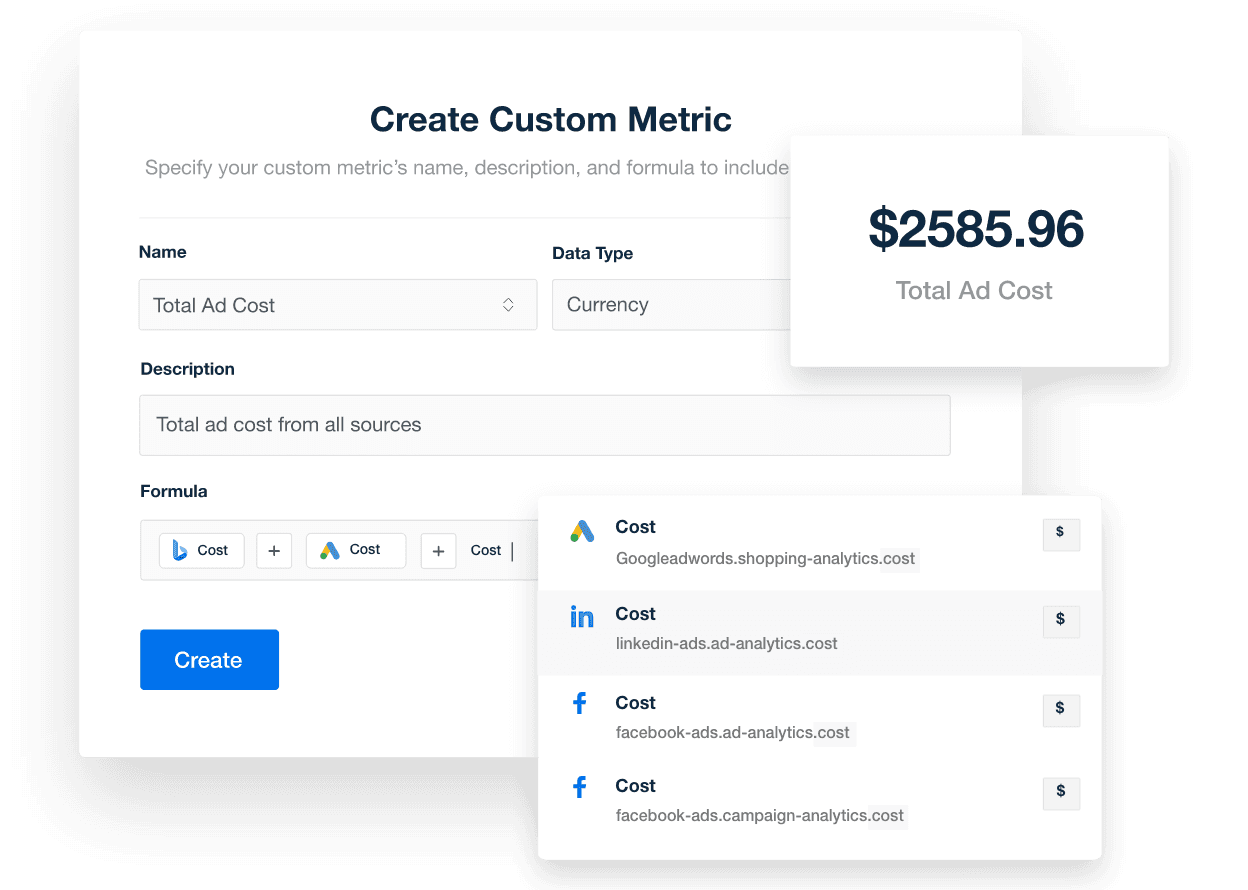
AgencyAnalytics offers white label reporting, allowing you to add your agency’s logo, colours, and branding for polished reports. AgencyAnalytics plans start at $59 per month with a free 14-day trial available.
2. AdRoll
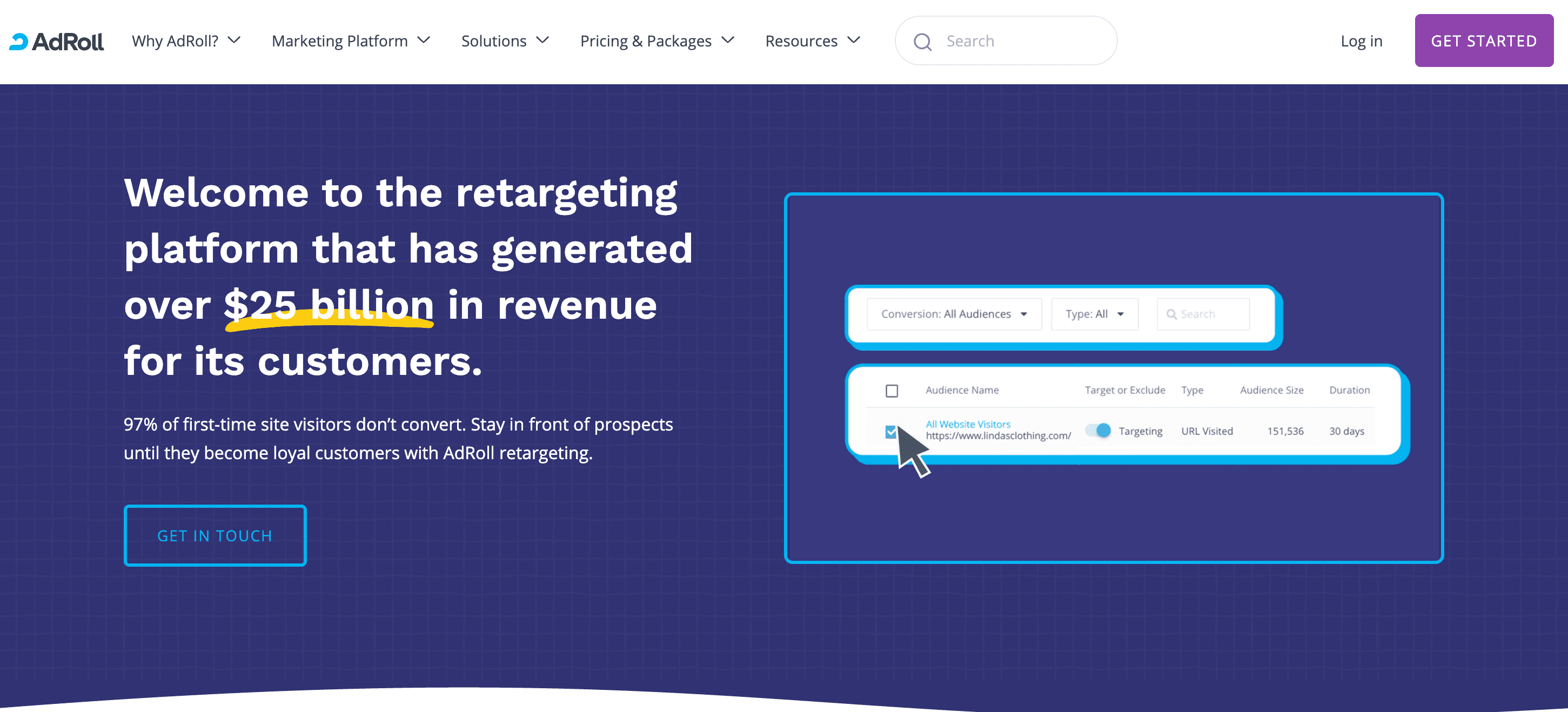
AdRoll is a powerful PPC tracking software built to help agencies track, manage, and optimize client PPC campaigns across multiple channels. Best known for its advanced retargeting capabilities, it also offers robust tracking features that help agencies monitor campaign performance.
AdRoll’s retargeting technology plays a key role in PPC tracking by keeping your client’s brand visible to potential customers who previously interacted with ads but didn’t convert. In addition to retargeting, AdRoll tracks key PPC metrics across paid search and social campaigns. This gives you clear visibility into which ads are driving traffic, re-engagement, and revenue.
AdRoll integrates with dozens of popular ecommerce and marketing platforms, including Shopify, TikTok, HubSpot, and more. Plus, its API makes it easy to build custom connections if needed.
AdRoll offers dynamic pricing based on CPM (cost per thousand impressions). AdRoll requires a minimum daily spend of $5 and a minimum daily budget of $10 to launch a campaign
Agency Tip: Get the best of both worlds by pairing AdRoll’s accurate retargeting data with AgencyAnalytics’ client-facing PPC dashboards with the AgencyAnalytics AdRoll integration.
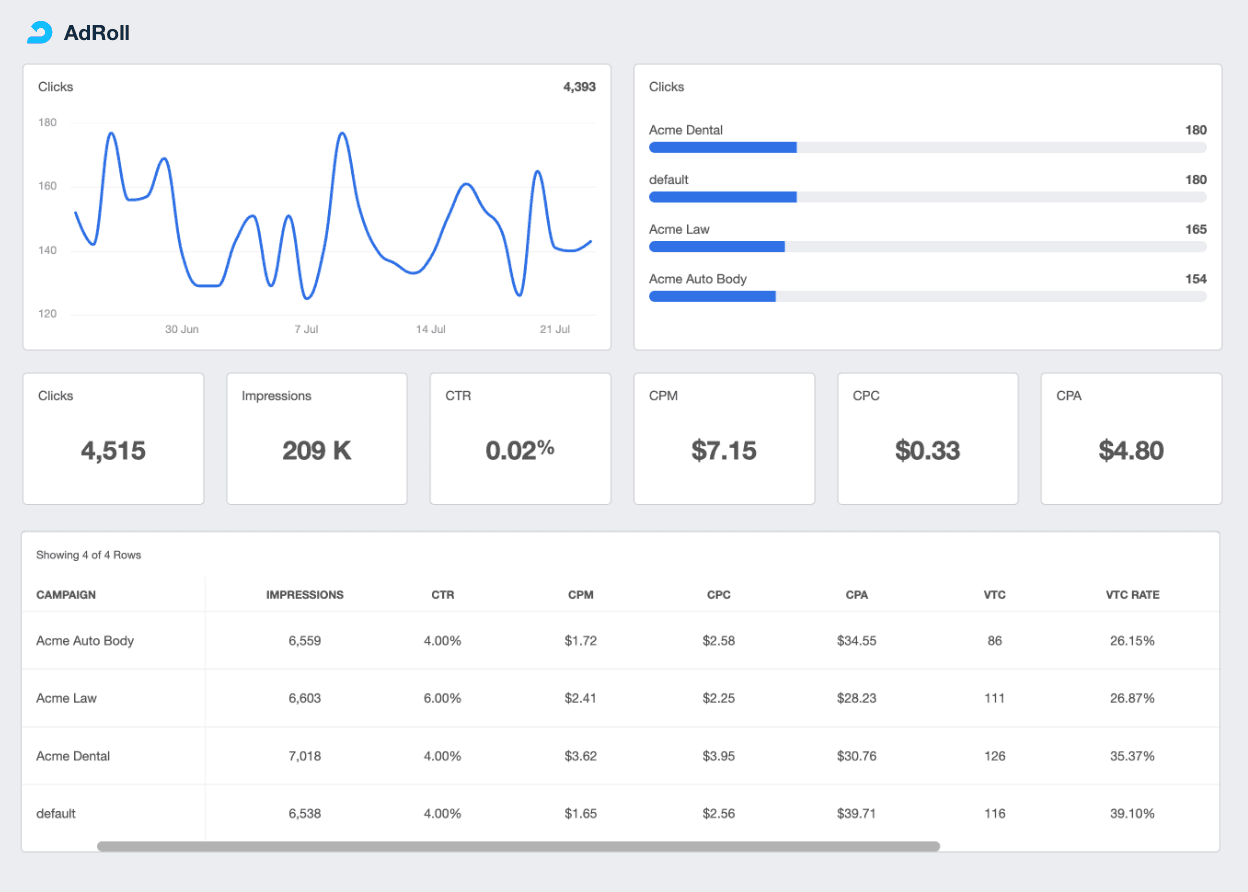
Bring AdRoll retargeting results alongside PPC in one report for a complete view of paid performance. Try AgencyAnalytics free for 14 days.
3. Semrush
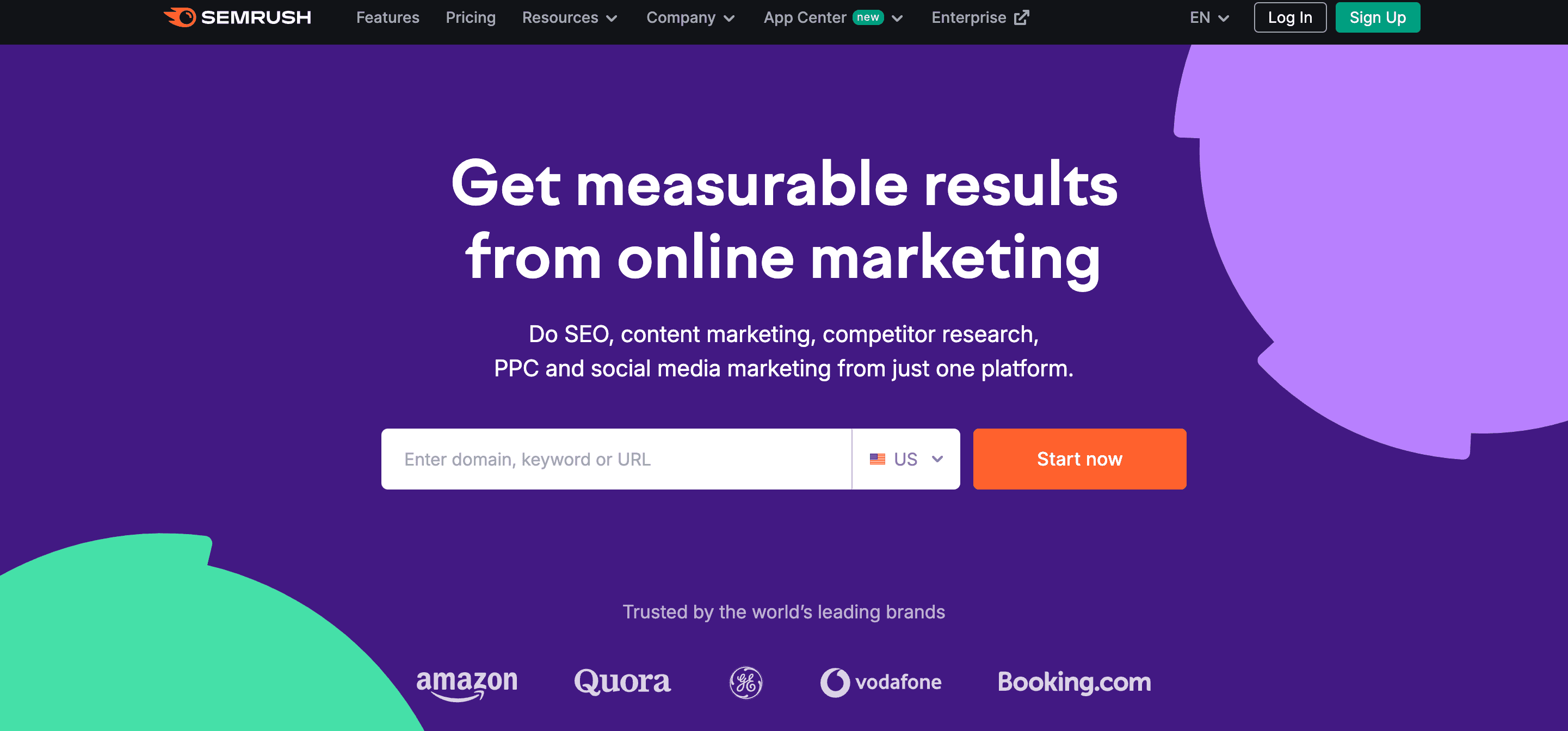
Semrush is widely known for its SEO capabilities, but it’s also a valuable tool for PPC ad tracking and analysis. Use Semrush to monitor competitors' PPC ads, review landing pages, and analyze ad copy to identify gaps and opportunities. This competitive insight helps refine client campaigns and spot areas where you can improve ad relevance and targeting.
The platform’s PPC keyword tracking and keyword research tools are also helpful for ongoing optimization. Build lists of cost-effective keywords, monitor search volume and CPC, and identify negative keywords to cut wasted spend.
Semrush plans start at $139.95 per month for the Pro plan, with a 7-day free trial available.
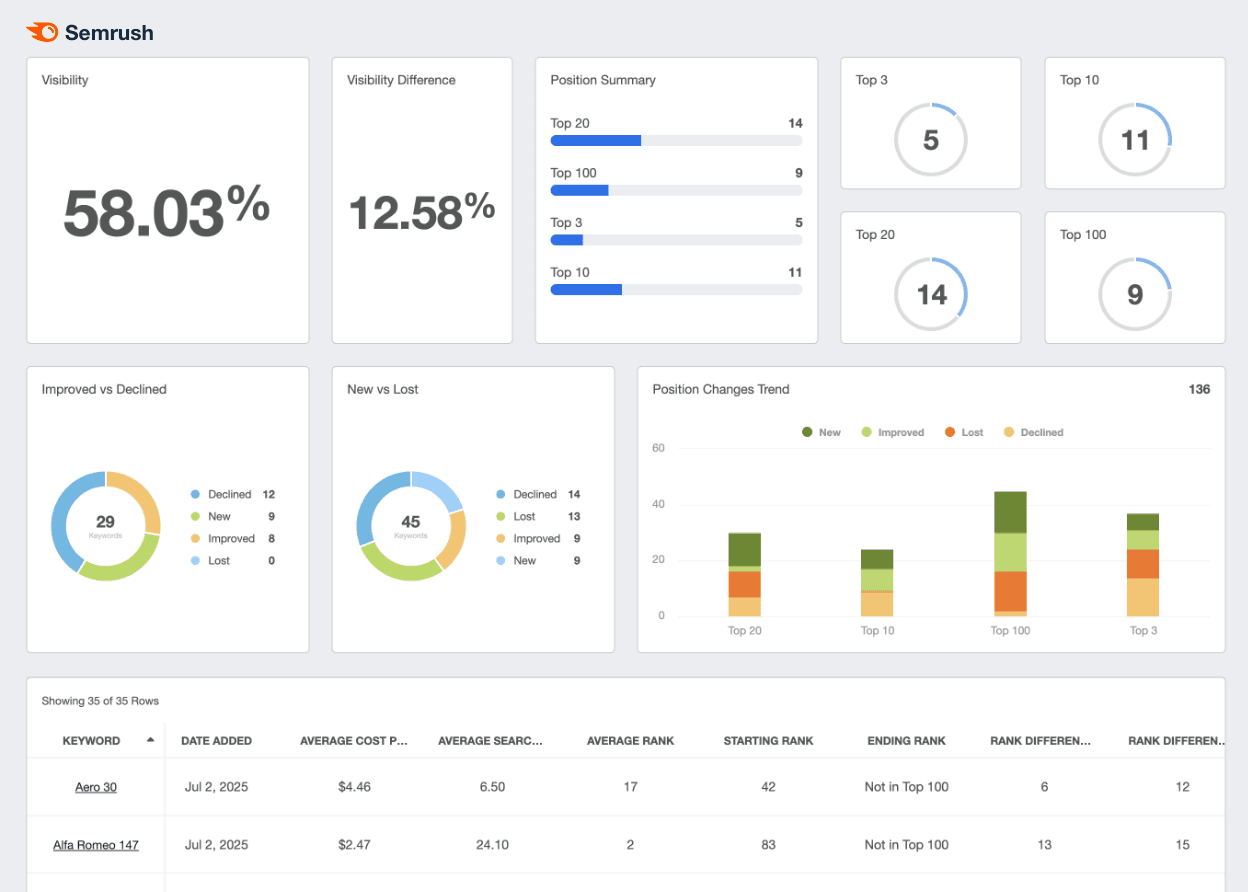
Use AgencyAnalytics to combine Semrush insights with real-time PPC campaign data from Google Ads, Microsoft Ads, and other platforms, all in one place. Try the Semrush integration free for 14 days.
Monitor & Report on PPC Performance With a Streamlined Platform
Tracking PPC metrics is only half the battle. Success comes from turning raw data into meaningful insights, optimizing campaigns in real time, and making your results crystal clear to clients.
Ultimately, the key to demonstrating the success of your PPC campaigns is to provide clear and transparent reporting that shows how your services are directly contributing to your clients' business objectives.
Justin Hoffman, Marketing & Sales, Web Solutions Firm
Without a centralized way to monitor and report on performance, your team wastes valuable hours jumping between platforms, and your clients are left guessing what’s driving ROI. That’s why agencies need more than just tracking. They need visibility.
AgencyAnalytics brings everything together in one streamlined platform.
See PPC performance at a glance across Google Ads, Microsoft Ads, paid social, and more.
Combine PPC, social, call tracking, and SEO data for a complete marketing view.
Automate reporting to keep clients informed with live, customizable dashboards.
Spot optimization opportunities fast and make proactive adjustments.
Build client trust with transparent, easy-to-understand performance reports.
The right PPC tracking setup keeps your team informed, your campaigns optimized, and your clients confident in your agency’s value.
Ready to streamline your PPC reporting and make your results impossible to ignore?
With AgencyAnalytics, we’re able to pull in PPC, social, call, and SEO data into the same platform, allowing our clients to view their entire marketing efforts with us with a single sign-on.

Healthcare Success

Written by
Sylva is an expert content writer with over 10 years of experience in tech and SaaS, offering first-hand insight into agency needs from her background in advertising.
Read more posts by Sylva SivzattianSee how 7,000+ marketing agencies help clients win
Free 14-day trial. No credit card required.



